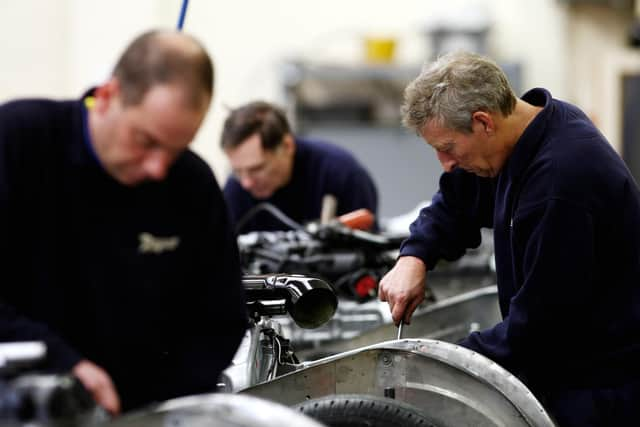You don’t bring good quality manufacturing jobs to the region by indulging in nostalgia - Andy Brown
There are parts of our region where the vibrancy of the town has never really returned, and the local High Street is a sad remnant of what used to exist.
Many of those factory jobs simply got exported to places where wages were lower as we switched from making most of the things that we consumed to importing them from places such as China.
Advertisement
Hide AdAdvertisement
Hide AdThere is therefore an understandable desire to see those manufacturing jobs come back. Some even believe that the way to do that is to cut regulations protecting workers, weaken environmental regulations and set up freeport zones where industry is allowed to adopt the same low standards as the Third World.


The chances of such an approach succeeding are virtually zero. You don’t get good quality manufacturing jobs by indulging in nostalgia for the way things used to be and launching a race to the bottom. Restoring our manufacturing base requires looking forward and investing for the future.
There is little or no point in Britain trying to compete to establish low wage low skill jobs in dirty industries. If we want to succeed, we have to focus on making products or equipment that are going to be needed in the next phase of technology, not ones that are becoming out of date.
The first step in achieving this is to have a healthy research and innovation culture stemming from successful universities and technical colleges. Britain has proved incredibly good at innovative science and technology at its strong Higher Education centres. That has been driven by the rapid exchange of ideas with colleagues from across the world which schemes like the EU’s Erasmus exchange programme promoted. Before we left it because of a daft ideological obsession with dumping anything associated with the EU.
Advertisement
Hide AdAdvertisement
Hide AdBritain has proved massively less good at taking those good ideas and turning them into successful products which we produce here and market across the world. Graphene was discovered in the north of England. The vast majority of its commercial uses were developed elsewhere.
We need to get a lot better at getting academic researchers linked up with design and marketing experts, startup business specialists and financial support from both the government and private finance.
Much of the financial expertise in this country has been focused on how to move money around between existing investments, how to avoid paying tax and on how to create complex financial instruments of the kind that helped cause the 2008 crash.
Managing high risk financial speculation has been a lot more lucrative than working with innovative people to create new businesses which actually make something. That badly needs to change. We need to create a culture of taking risks on new ventures, some of which will fail whilst others will prove exceptionally rewarding.
Advertisement
Hide AdAdvertisement
Hide AdNothing illustrates the dominance of the needs of financial speculators over the needs of the manufacturing industry better than Brexit. The Brexit campaign was heavily funded by financial speculators and strongly opposed by most manufacturing exporters.
It is incredibly difficult to make something in this country that is as sophisticated as a new car or a washing machine without moving components across European borders. It is even more difficult to sell products at the scale that is required to make them competitive when it isn’t possible to sell across Europe without having to worry about rules, regulations and tariffs.
Many people voted for Brexit because they wanted to bring back Britain’s industrial success. Unfortunately, what has actually happened is a further weakening of manufacturing. The sooner we rejoin the better.
Perhaps the most critical element in bringing back successful manufacturing is ensuring that our products and the way they are made are fit for the future. That means investing in products that suit what the economy is going to be like in future decades, not what existed in the past.
Advertisement
Hide AdAdvertisement
Hide AdThe most likely changes to the world economy are significant growth in healthcare and science related industries, a rapid expansion in machine learning technology, and the growth of green technology.
It is now obvious to scientists that we can’t continue to fuel our civilisation by burning fossils that can’t be replaced and are starting to generate increasingly chaotic climate conditions. The best way to restore our manufacturing is therefore to make sure that we are ahead of others in creating products and technologies that don’t rely on fossil fuels and don’t generate massive amounts of plastic waste.
Andy Brown is the Green Party councillor for Aire Valley in North Yorkshire.
Comment Guidelines
National World encourages reader discussion on our stories. User feedback, insights and back-and-forth exchanges add a rich layer of context to reporting. Please review our Community Guidelines before commenting.